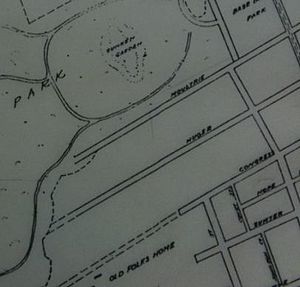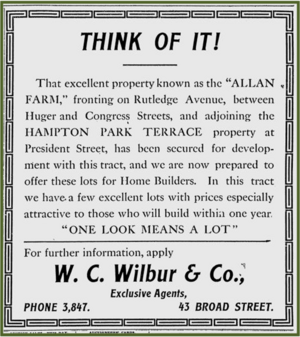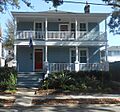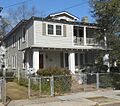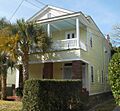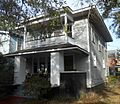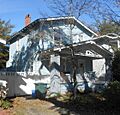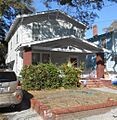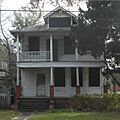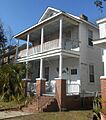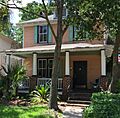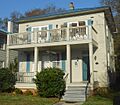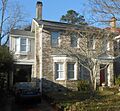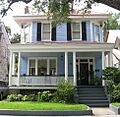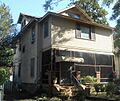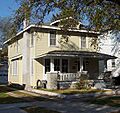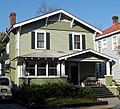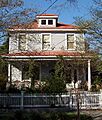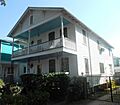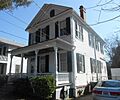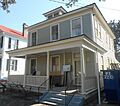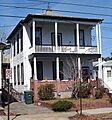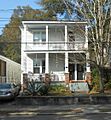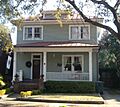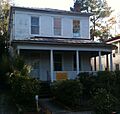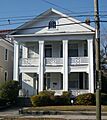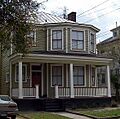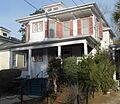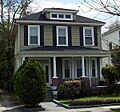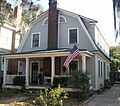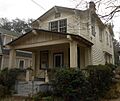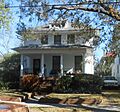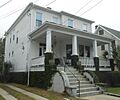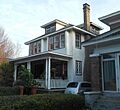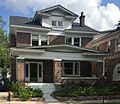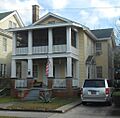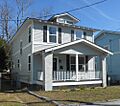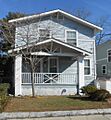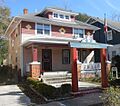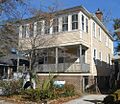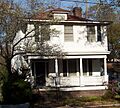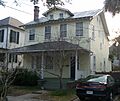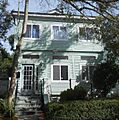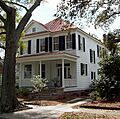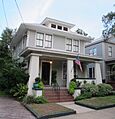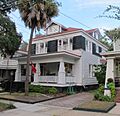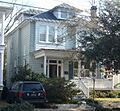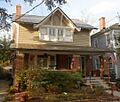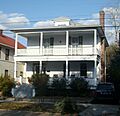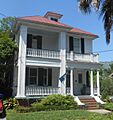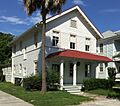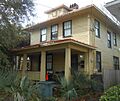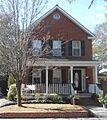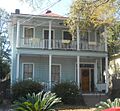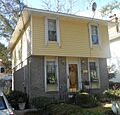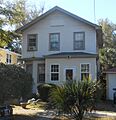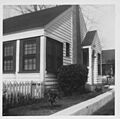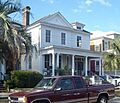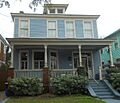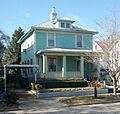Hampton Park Terrace facts for kids
Quick facts for kids |
|
|
Hampton Park Terrace Historic District
|
|
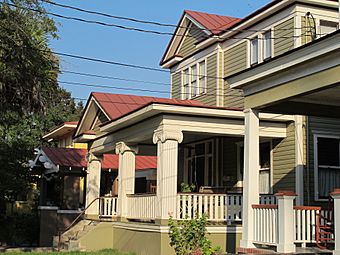
Houses along Huger St. produce a consistent streetscape.
|
|
| Location | Roughly bounded by Hagood, and Rutledge Aves., and Moultrie, and Congress Sts., Charleston, South Carolina |
|---|---|
| Area | 31 acres (13 ha) |
| Built | 1912 |
| Architectural style | Late 19th And Early 20th Century American Movements, Late 19th And 20th Century Revivals |
| NRHP reference No. | 97001186 |
| Added to NRHP | September 26, 1997 |
Hampton Park Terrace is a special place in Charleston, South Carolina. It's both a neighborhood where people live and a historic district. A historic district is an area recognized for its important old buildings.
The neighborhood is located on a peninsula. It's bordered by The Citadel (a military college) to the west. To the north is Hampton Park. Rutledge Avenue is to the east, and Congress Street is to the south.
Contents
History of Hampton Park Terrace
This area was mostly open land until about 1900. Around that time, some streets started to appear in the northern part of Charleston. A few small houses were built, but most of the land was still empty.
In 1912, big plans were made for three large parts of the neighborhood. These areas were developed by different companies. The Charleston Building & Investment Co. worked on one part. Hampton Park Terrace Inc. developed another. The Allan family developed the third section. The last part of the neighborhood was built up slowly through the 1930s.
At first, some people thought this new development would not be popular. It was on the very edge of Charleston's developed areas. But they were wrong! Within just one month, over 100 of the 251 lots were sold.
The area was near farms, but it had great benefits. It was close to the Ashley River and Hampton Park. A newspaper at the time said it was a perfect spot for homes. It was quiet, away from city noise, and had fresh breezes from the river. It was also high and dry, and close to good schools. People started to prefer living in this "suburban" area.
In March 2012, the residents of Hampton Park Terrace celebrated the neighborhood's 100th birthday. The celebration included music from The Citadel's band. They also revealed a special state historical marker.
Why is it a National Historic Place?
Most of the houses in Hampton Park Terrace were built between 1912 and 1925. The style of these houses was new for Charleston. It was different from the older, traditional buildings in other parts of the city.
Because it has so many well-preserved buildings from the early 1900s, the neighborhood was added to the National Register of Historic Places on September 26, 1997. The National Register is a list of places important to American history. Being on this list helps protect the historic character of the area.
After the area became a historic district, many houses were restored. One house at 463 Huger Street even won an award for its excellent restoration! In 2009, the Preservation Society of Charleston held a special tour. They showed off the beautiful historic houses in Hampton Park Terrace.
Streets in the Historic District
The Hampton Park Terrace National Register district includes historic buildings on these streets:
- Ashley Ave. (north of Congress St. to Huger St.)
- Congress St. (west of Rutledge Ave. to President St. (north side) and west of President St. (both sides))
- Elmwood Ave. (all)
- Glenwood Ave. (all)
- Hagood Ave. (north of Congress St. to Moultrie St. (east side))
- Huger St. (west of Rutledge Ave. to Ashley Ave. (south side) and west of Ashley Ave. (both sides))
- Kenilworth Ave. (all)
- Moultrie St. (west of Ashley Ave.)
- North Allan Park (all)
- Parkwood Ave. (all)
- President St. (north of Sumter St. to Congress St. (west side) and north of Congress St. (both sides))
- Rutledge Ave. (north of Congress St. to Huger St. (west side))
- South Allan Park (all)
- Sumter St. (west of President St. (north side))
- Sutherland Ave. (all)
- Sutherland Ct. (all)
- Wesson Ave. (all)
Images for kids
 | Bessie Coleman |
 | Spann Watson |
 | Jill E. Brown |
 | Sherman W. White |




